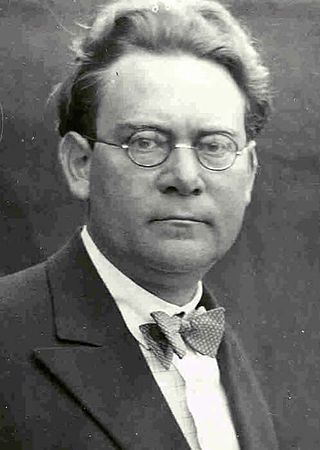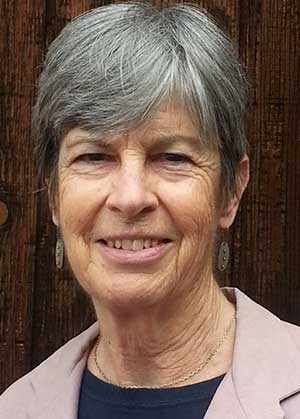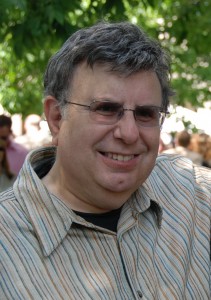Related Research Articles

In philosophy, systems theory, science, and art, emergence occurs when a complex entity has properties or behaviors that its parts do not have on their own, and emerge only when they interact in a wider whole.

Reductionism is any of several related philosophical ideas regarding the associations between phenomena which can be described in terms of other simpler or more fundamental phenomena. It is also described as an intellectual and philosophical position that interprets a complex system as the sum of its parts.

Teleology or finality is a branch of causality giving the reason or an explanation for something as a function of its end, its purpose, or its goal, as opposed to as a function of its cause.

Charles Margrave Taylor is a Canadian philosopher from Montreal, Quebec, and professor emeritus at McGill University best known for his contributions to political philosophy, the philosophy of social science, the history of philosophy, and intellectual history. His work has earned him the Kyoto Prize, the Templeton Prize, the Berggruen Prize for Philosophy, and the John W. Kluge Prize.

Patricia Smith Churchland is a Canadian-American analytic philosopher noted for her contributions to neurophilosophy and the philosophy of mind. She is UC President's Professor of Philosophy Emerita at the University of California, San Diego (UCSD), where she has taught since 1984. She has also held an adjunct professorship at the Salk Institute for Biological Studies since 1989. She is a member of the Board of Trustees Moscow Center for Consciousness Studies of Philosophy Department, Moscow State University. In 2015, she was elected a Fellow of the American Academy of Arts & Sciences. Educated at the University of British Columbia, the University of Pittsburgh, and Somerville College, Oxford, she taught philosophy at the University of Manitoba from 1969 to 1984 and is married to the philosopher Paul Churchland. Larissa MacFarquhar, writing for The New Yorker, observed of the philosophical couple that: "Their work is so similar that they are sometimes discussed, in journals and books, as one person."

Hans Reichenbach was a leading philosopher of science, educator, and proponent of logical empiricism. He was influential in the areas of science, education, and of logical empiricism. He founded the Gesellschaft für empirische Philosophie in Berlin in 1928, also known as the "Berlin Circle". Carl Gustav Hempel, Richard von Mises, David Hilbert and Kurt Grelling all became members of the Berlin Circle.
The philosophy of biology is a subfield of philosophy of science, which deals with epistemological, metaphysical, and ethical issues in the biological and biomedical sciences. Although philosophers of science and philosophers generally have long been interested in biology, philosophy of biology only emerged as an independent field of philosophy in the 1960s and 1970s, associated with the research of David Hull. Philosophers of science then began paying increasing attention to biology, from the rise of Neodarwinism in the 1930s and 1940s to the discovery of the structure of DNA in 1953 to more recent advances in genetic engineering. Other key ideas include the reduction of all life processes to biochemical reactions, and the incorporation of psychology into a broader neuroscience.

Evelyn Fox Keller was an American physicist, author, and feminist. She was Professor Emerita of History and Philosophy of Science at the Massachusetts Institute of Technology. Keller's early work concentrated at the intersection of physics and biology. Her subsequent research focused on the history and philosophy of modern biology and on gender and science.
Paul Montgomery Churchland is a Canadian philosopher known for his studies in neurophilosophy and the philosophy of mind. After earning a Ph.D. from the University of Pittsburgh under Wilfrid Sellars (1969), Churchland rose to the rank of full professor at the University of Manitoba before accepting the Valtz Family Endowed Chair in Philosophy at the University of California, San Diego (UCSD) and joint appointments in that institution's Institute for Neural Computation and on its Cognitive Science Faculty.

Helen Elizabeth Longino is an American philosopher of science who has argued for the significance of values and social interactions to scientific inquiry. She has written about the role of women in science and is a central figure in feminist epistemology and social epistemology. She is the Clarence Irving Lewis Professor of Philosophy at Stanford University. In 2016, she was elected to the American Academy of Arts and Sciences.
Antireductionism is the position in science and metaphysics that stands in contrast to reductionism (anti-holism) by advocating that not all properties of a system can be explained in terms of its constituent parts and their interactions.

Allan Stanley Gotthelf was an American philosopher. He was a scholar of the philosophies of both Aristotle and Ayn Rand.
Elisabeth Anne Lloyd is an American philosopher of science specialising in the philosophy of biology. She is currently Distinguished Professor of History and Philosophy of Science and Medicine - as well as Adjunct Professor of biology - at Indiana University, Bloomington, affiliated faculty scholar at the Kinsey Institute and Adjunct Faculty at the Center for the Integrative Study of Animal Behavior.
Scientific pluralism is a position within the philosophy of science that rejects various proposed unities of scientific method and subject matter. Scientific pluralists hold that science is not unified in one or more of the following ways: the metaphysics of its subject matter, the epistemology of scientific knowledge, or the research methods and models that should be used. Some pluralists believe that pluralism is necessary due to the nature of science. Others say that since scientific disciplines already vary in practice, there is no reason to believe this variation is wrong until a specific unification is empirically proven. Finally, some hold that pluralism should be allowed for normative reasons, even if unity were possible in theory.

William C. Wimsatt is professor emeritus in the Department of Philosophy, the Committee on Conceptual and Historical Studies of Science, and the Committee on Evolutionary Biology at the University of Chicago. He is currently a Winton Professor of the Liberal Arts at the University of Minnesota and Residential Fellow of the Minnesota Center for Philosophy of Science. He specializes in the philosophy of biology, where his areas of interest include reductionism, heuristics, emergence, scientific modeling, heredity, and cultural evolution.
John A. Dupré is a British philosopher of science. He is the director of Egenis, the Centre for the Study of Life Sciences, and professor of philosophy at the University of Exeter. Dupré's chief work area lies in philosophy of biology, philosophy of the social sciences, and general philosophy of science. Dupré, together with Nancy Cartwright, Ian Hacking, Patrick Suppes and Peter Galison, are often grouped together as the "Stanford School" of philosophy of science. In 2023, he was elected to the American Philosophical Society.
James G. Lennox is an emeritus professor in the Department of History and Philosophy of Science at the University of Pittsburgh, United States, with secondary appointments in the departments of Classics and Philosophy. He is a leader in the study of Aristotelian science in light of his groundbreaking work on Aristotle's biology and philosophy of biology. In particular, Lennox's work in the 1980s catalyzed a renewed interest in Aristotle's biology by arguing that his natural historical works are consistent with and even demonstrative of the scientific methodology he lays out in the Posterior Analytics. Lennox's work on teleology in the history of biology, particularly in the thought of Charles Darwin, has also been influential.
Dean Rickles is Professor of History and Philosophy of Modern Physics at the University of Sydney and a Director of the Sydney Centre for Time.

Alice Crary is an American philosopher who currently holds the positions of University Distinguished Professor at the Graduate Faculty, The New School for Social Research in New York City and Visiting Fellow at Regent's Park College, University of Oxford, U.K..
References
- ↑ Brian Leiter, 2011 the Philosophical Gourmet Archived 2012-09-09 at archive.today , retrieved 1/24/2012
- ↑ "Die Weltformel ist tot", in Der Spiegel, 2008-05-30 , retrieved 2008-06-22